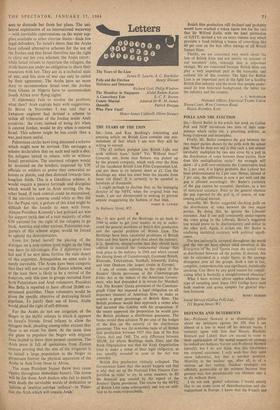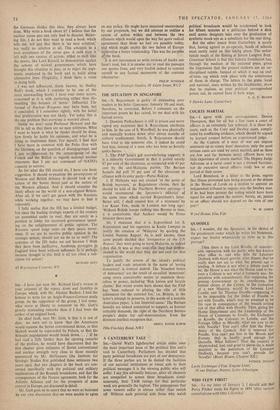DEFENCES AND DETERRENTS
Sia,—Professor Howard is so disarmingly polite about my strictures against the ISS that I am almost at a loss to ward off his delicate barbs. I certainly agree with him that Messrs. Blackett, Buzzard and Liddell Hart are second to none in their appreciation of the moral aspects of strategy (as indeed are Anthony Verrier and Professor Howard himself), but I do not think that this invalidates my original statement. I only wish that they were more influential, but that is another question. Morality in the nuclear age, after all, is of a curious ad hoc variety. Nuclear strategies are officially permissible at the moment because they prevent war, but paradoxically our ultimate aim is to do without them.
I do not seek 'global' solutions; I would merely like to see some form of denuclearisation and dis- engagement in Europe. I know that the French and the Germans dislike this idea; they always have done. Why write a book about it? 1 believe that the nuclear status quo can only lead to disaster. Believ- ing this, I do not then want to read a book which tells me, not just that there is `no easy solution,' but really no solution at all. This amounts to a tacit acceptance of the statu,s quo. A sane man is left with two courses of action: either to rush 'into the streets, like Lord Russell, to demonstrate against the actions of wicked governments which have brought this situation to pass, or to reject the argu- ments employed in the book and to build along alternative lines. Illogically, I think there is value in doing both.
I was not influenced, thank heaven, by Hedley Bull's book, which I consider to be one of the most unrewarding books I have ever come across, concerned as it is with perfecting rather than dis- mantling 'the balance of terror.' Influential The Spread of Nuclear Weapons may have been, but it concluded, if I remember rightly, with the belief that 'proliferation was not likely. Yet today this is the one problem that everyone is worried about.
Surely we don't need Professor Howard and the 1SS to tell us that there are no easy solutions. What I want to know is what he thinks should be done, how firmly he holds his opinions, and what he is doing to implement them. For myself, l find that I have more in common with the Poles than with the Germans on the question of disengagement, and I am' so 'depressed by the intransigence of the French and the British as regards national nuclear deterrents that I am not convinced of NATO's capacity to survive.
As for what the ISS should do, I have one basic suggestion. It should re-examine the assumptions of Western and British defence. It should look at the nature of the Soviet threat and at the nature of the Western alliance. And it should examine the likely effects on the world of a non-aligned Britain. After all, if we can't get peace with the Russians while working together, we may have to find it separately.
I fully realise that the ISS has a limited budget, but since the leading strategic experts of the country are assembled under its roof, they are surely in a position to lobby for increased government spend- ing on the enlightenment of public opinion. The Russians spend large sums on their peace move- ment. If we are to involve public opinion in the strategic debate, should not we do so as well? The activities of the ISS make me sad because I think they have been ineffective. Academic strategists England have been without influence. Is it perhaps because thought in this field is all too often a sub- stitute for action?



































 Previous page
Previous page